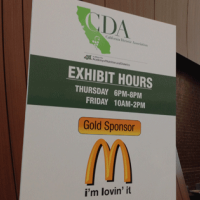Food for Thoughtlessness at State Dietetic Conference Catered by McDonald's
 (photo: Kiera Butler, Mother Jones)
(photo: Kiera Butler, Mother Jones)
One of the avowed goals of the California Dietetic Association (CDA) is to facilitate “the delivery of healthcare to California” and “ensure and promote informed food decisions by consumers.”
To that end, the association held its annual conference for nutritionists and dieticians at the Marriott Hotel in Pomona last month and served up a heaping helping of junk food, junk science and corporate propaganda. Kiera Butler of Mother Jones attended to chew the fat (and gristle) with its members, listen to panel discussions of “experts” and generally make a nuisance of herself.
After sitting in on a panel discussion sponsored by the Corn Refiners Association whose subject was “Sweeteners in Schools: Keeping Science First in a Controversial Discussion,” Butler asked conference spokeswoman Pat Smith why the entire panel was made up of corn refiners, who are pushing high fructose corn syrup. Smith responded, “We like to think that our dietitians have a thought process and that we are presenting them with what is out there.”
That sort of one-sided presentation was generally the rule at the conference, which wasn't surprising when one notes that the conference's chief (“Gold”) sponsor was McDonald's, which catered their lunch. Other food goodies were available at booths run by Hershey's (“miniature cartons of chocolate and strawberry milk”), Butter Buds (“packets of fake butter crystals”) and the California Beef Council, where Butler picked up a pamphlet that told how to lose weight by only eating steak.
There were sessions on safe and environmentally sustainable genetically-modified food and the gluten intolerance fad, which has no medical basis. (Thank you, Wheat Council).
The CDA's parent organization is the national Academy of Nutrition and Dietetics (AND), which has 75,000 members and is the world's largest association of such foodie professionals. AND provides educational accreditation to those who pass its exams and lobbies extensively on a wide range of issues, including the federal farm bill, Medicare and childhood obesity.
AND relies financially on its 38 corporate sponsors, including Coca Cola, Nestlé and Mars candies, for 40% of its funding. That's money it puts to good use, noting on the website promoting its own annual conference, “Few groups have more influence over the way Americans eat than our members.”
Michelle Simon, a public health attorney and food industry watchdog, agrees, and is slightly nauseous over it. In her report (pdf), “And Now a Word from Out Sponsors,” she catalogues the group's growing influence among decision makers, nutrition professionals and the public. She found that 80% of registered dietitians think a corporate sponsorship at AND carries an implicit endorsement of the company and its products.
AND's most loyal corporate sponsors are the National Cattlemen's Beef Association, ConAgra Food, General Mills, Kellogg's and the National Dairy Council. Its number of corporate sponsors has nearly quadrupled since 2001.
They make it possible for the organization to put on conferences and promote continuing education courses. The list of approved providers of courses includes Coca-Cola, Kraft Foods and Nestlé. The Coca-Cola courses teach that “sugar is not harmful to children; aspartame is completely safe, including for children over one year; and the Institute of Medicine is too restrictive in its school nutrition standards,” according to Simon.
Dietitican Andy Bellatti, an AND member and former blogger, wrote about his educational experience at the organization's 2008 national conference. “I could get continuing education credits for literally sitting in a room and listening to Frito-Lay tell me that Sun Chips are a good way to meet my fiber needs.”
Critics of AND and other corporate spoon-fed nutrition groups argue that the problem isn't just the awful information they disseminate; it's what they don't say. The largest, most influential voices for good nutrition in our country do not criticize their corporate sponsors. It's not that they are necessarily recommending to youngsters that they wolf down a bowl of Froot Loops and a Diet Coke for breakfast; it's that they don't recommend not doing that.
Silence from a key organization ostensibly committed to good health and nutrition is golden for corporate sponsors who notoriously only care about their bottom lines.
–Ken Broder
To Learn More:
I Went to the Nutritionists' Annual Confab. It Was Catered by McDonald's. (by Kiera Butler, Mother Jones)
AND Now a Word from Our Sponsors (by Michelle Simon, EatDrink Politics) (pdf)
The Academy of Nutrition and Dietetics’ Big Food Controversy (by Andy Bellatti, Civil Eats)
Nutritional Value of Fast Food Has Hardly Increased in 14 Years (by Noel Brinkerhoff, AllGov)
- Top Stories
- Controversies
- Where is the Money Going?
- California and the Nation
- Appointments and Resignations
- Unusual News
- Latest News
- California Forbids U.S. Immigration Agents from Pretending to be Police
- California Lawmakers Urged to Strip “Self-Dealing” Tax Board of Its Duties
- Big Oil’s Grip on California
- Santa Cruz Police See Homeland Security Betrayal in Use of Gang Roundup as Cover for Immigration Raid
- Oil Companies Face Deadline to Stop Polluting California Groundwater





